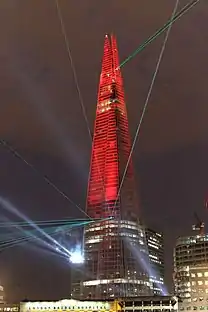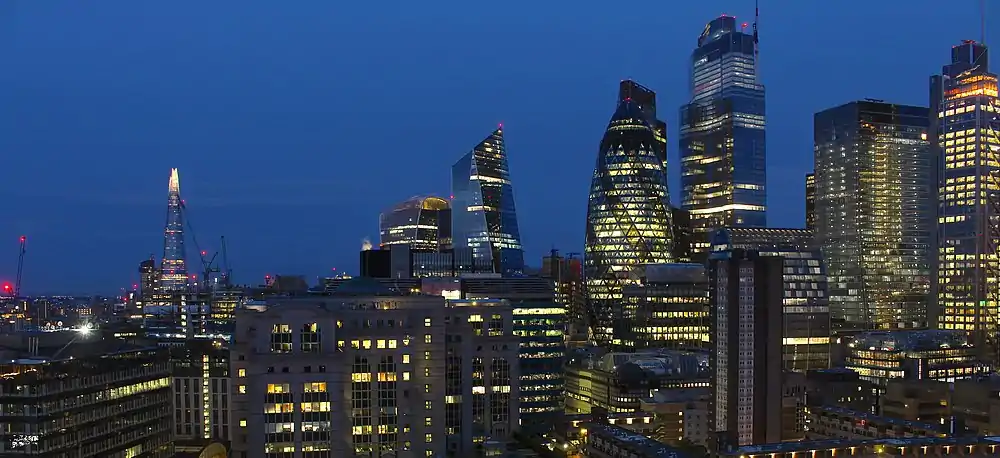The Shard
The Shard,[lower-alpha 1] also referred to as the Shard of Glass,[10][11] Shard London Bridge[12] and formerly London Bridge Tower,[13][14][15] is a 72-storey skyscraper, designed by the Italian architect Renzo Piano, in Southwark, London, that forms part of the Shard Quarter development. Standing 309.6 metres (1,016 feet) high, the Shard is the tallest building in the United Kingdom, and the sixth-tallest building in Europe.[3][16][17] It is also the second-tallest free-standing structure in the United Kingdom, after the concrete tower of the Emley Moor transmitting station.[18] It replaced Southwark Towers, a 24-storey office block built on the site in 1975.
| The Shard | |
|---|---|
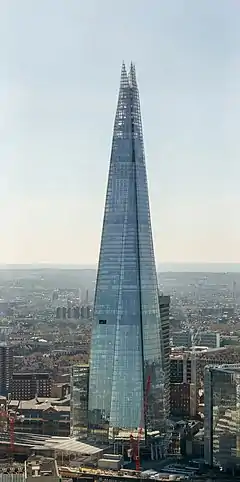 The Shard in April 2015 | |

| |
| Alternative names | Shard of Glass, Shard London Bridge |
| Record height | |
| Tallest in the United Kingdom since 2012[1][I] | |
| Preceded by | One Canada Square |
| General information | |
| Status | Complete |
| Architectural style | Neo-futurism[2] |
| Location | London, SE1 |
| Coordinates | 51.5045°N 0.0865°W |
| Construction started | March 2009 |
| Completed | July 2012 |
| Opening | 1 February 2013 |
| Cost | ~£435,023,452 (contract cost only) |
| Owner | State of Qatar (95%) Sellar Property Group (5%) |
| Height | |
| Architectural | 309.6 m (1,016 ft)[3] |
| Observatory | 244 m (801 ft) |
| Technical details | |
| Floor count | 96 (72 habitable) |
| Floor area | 398,490 m2 (4,289,300 sq ft) |
| Lifts/elevators | 36 |
| Design and construction | |
| Architect | Renzo Piano |
| Developer | Sellar Property Group |
| Structural engineer | WSP Global (structural engineers), Robert Bird Group (concrete temporary works), Ischebeck Titan on most floors 40+ (concrete support) |
| Services engineer | Arup |
| Main contractor | Mace |
| References | |
| [4][5][6][7][8][9] | |
The Shard's construction began in March 2009; it was topped out on 30 March 2012[19] and inaugurated on 5 July 2012. Practical completion was achieved in November 2012. The tower's privately operated observation deck, The View from The Shard, was opened to the public on 1 February 2013.[4][20][21] The glass-clad pyramidal tower has 72 habitable floors, with a viewing gallery and open-air observation deck on the 72nd floor, at a height of 244 metres (801 ft).[7][22] The Shard was developed by Sellar Property Group on behalf of LBQ Ltd and is jointly owned by Sellar Property (5%) and the State of Qatar (95%).[9] The Shard is managed by Real Estate Management (UK) Limited on behalf of the owners.
Background
Planning
In 1998, London-based entrepreneur Irvine Sellar and his then-partners decided to redevelop the 1970s-era Southwark Towers following a UK government white paper encouraging the development of tall buildings at major transport hubs. Sellar flew to Berlin in the spring of 2000 to meet the Italian architect Renzo Piano for lunch. According to Sellar, Piano spoke of his contempt for conventional tall buildings during the meal, before flipping over the restaurant's menu and sketching a spire-like sculpture emerging from the River Thames.[23]
In July 2002, the then-Deputy Prime Minister, John Prescott, ordered a planning inquiry after the development plans for the Shard were opposed by the Commission for Architecture and the Built Environment and several heritage bodies, including the Royal Parks Foundation and English Heritage.[24][25] The inquiry took place in April and May 2003,[13][26] and on 19 November 2003, the Office of the Deputy Prime Minister announced that planning consent had been approved.[27] The government stated that:
Mr Prescott would only approve skyscrapers of exceptional design. For a building of this size to be acceptable, the quality of its design is critical. He is satisfied that the proposed tower is of the highest architectural quality.
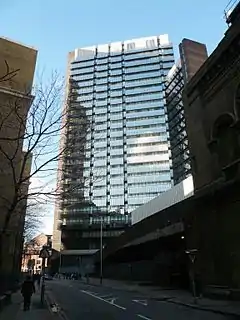
Sellar and his original partners CLS Holdings plc and CN Ltd (acting for the Halabi Family Trust) secured an interim funding package of £196 million in September 2006 from the Nationwide Building Society and Kaupthing Singer & Friedlander. This enabled them to pay off the costs already incurred and to buy out the Southwark Towers occupational lease from the building's tenants, PricewaterhouseCoopers.[28] Vacant possession of the site was secured a year later, after PricewaterhouseCoopers completed the relocation of their operations.
In September 2007, preparations for the demolition of Southwark Towers began.[29] However, later that same month, turbulence in the financial markets reportedly put the Shard's construction in jeopardy,[30] threatening to render the project an example of the Skyscraper Index.
In November 2007, building contractor Mace was awarded the contract to build the Shard for a fixed price of no more than £350 million. However, this price increased to almost £435 million in October 2008.[31]
In April 2008, demolition of Southwark Towers was visibly under way,[32] and by October, the building had been substantially reduced in height, and was no longer visible on the skyline. The demolition was completed in early 2009, and site preparation began for the construction of the Shard.
Funding
Towards the end of 2007, the gathering uncertainty in the global financial markets sparked concerns about the viability of the Shard. However, in January 2008, Sellar announced that it had secured funding from a consortium of Qatari investors, who had paid £150 million to secure an 80% stake in the project.[33] The consortium included Qatar National Bank, QInvest, Qatari Islamic Bank and the Qatari property developer Barwa Real Estate, as well as Sellar Property. The deal involved a buyout of the Halabi and CLS Holdings stakes, and part of the Sellar Property stake.[34] The new owners promised to provide the first tranche of finance, allowing construction of the tower to begin. In 2009, the State of Qatar consolidated its ownership of London Bridge Quarter (known now as Shard Quarter), including The Shard, through the purchase of the private Qatari investors' stakes. Shard Quarter is today jointly owned by the State of Qatar and Sellar.[9]
Architecture
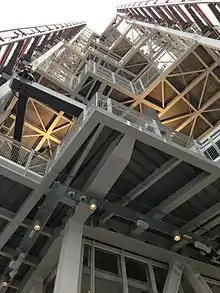
Renzo Piano, the project's architect, designed The Shard as a spire-like sculpture emerging from the River Thames.[23] He was inspired by the railway lines next to the site, the London spires depicted by the 18th-century Venetian painter Canaletto, and the masts of sailing ships.[15] Piano's design met criticism from English Heritage, who claimed the building would be "a shard of glass through the heart of historic London", giving the building its name, The Shard.[35] Piano considered the slender, spire-like form of the tower a positive addition to the London skyline, recalling the church steeples featured in historic engravings of the city, and believed that its presence would be far more delicate than opponents of the project alleged. He proposed a sophisticated use of glazing, with expressive façades of angled glass panes intended to reflect sunlight and the sky above, so that the appearance of the building will change according to the weather and seasons.[36] The building features 11,000 panes of glass, with a total surface area of 602,779 square feet (56,000.0 m2) equivalent to the area of almost eight Wembley football pitches.
The Shard was designed with energy efficiency in mind. It is fitted with a combined heat and power (CHP) plant, operating on natural gas from the National Grid. Fuel is efficiently converted to electricity, and heat is recovered from the engine to provide hot water for the building.[37]
Following the destruction of New York's World Trade Center (WTC) in the terror attacks of 11 September 2001, architects and structural engineers worldwide began re-evaluating the design of tall structures. The Shard's early conceptual designs were among the first in the UK to be amended following the publication of the US National Institute of Standards and Technology (NIST) report into the collapse of the WTC. The building is designed to maintain its stability under very onerous conditions,[38] with its post-tensioned concrete and composite floors, load-bearing pillars and tapering shape giving it a sway tolerance of 400 millimetres (16 in).[39]
In 2014, The Shard claimed first place at the Emporis Skyscraper Awards, recognising buildings over 100 m (328 ft) completed in the previous twelve months. The Emporis judges hailed the building as "a skyscraper that is recognized immediately and which is already considered London's new emblem".[40]
Layout
| Floors | Space designation |
|---|---|
| 73–95 | Spire |
| 68–72 | The View from The Shard (observatory) |
| 53–65 | Residences |
| 34–52 | Shangri-La Hotel |
| 33 | Hutong |
| 32 | Oblix |
| 31 | Aqua Shard |
| 28 | South Hook Gas |
| 27 | Arma Partners / Campari Group |
| 26 | CoStar Group |
| 24–25 | The Office Group |
| 23 | Foresight Group |
| 22 | Khazanah / Jellyfish |
| 20–21 | Kraft Heinz |
| 19 | Medical Protection Society |
| 18 | Gallup / Foresight Group |
| 17 | Warwick Business School / Sage Group |
| 16 | Al Jazeera English |
| 15 | Mathys & Squire / Arcapita / Xio Partners / Fulcrum Chambers |
| 14 | Duff & Phelps |
| 13 | Warwick Business School / Duff & Phelps / Sage Group |
| 12 | Mitie |
| 11 | Dods Group / Matches Fashion |
| 10 | Real Estate Management (UK) Limited / Robert Half / Protiviti |
| 9 | IO Oil and Gas / Sapphire Systems / Siteimprove |
| 8 | Greenberg Traurig / Matches Fashion |
| 7 | Tiffany & Co. / Matches Fashion |
| 4–6 | Clinic (HCA Healthcare at the Shard)[41] |
| 3 | Shard Quarter Management Suite |
| 2 | Office Reception |
| Ground | Hotel, restaurant and observatory entrances |
Sources: The-Shard.com[42] and The-Shard.com[43] and Billionpoints.de.[44]
Construction
For the construction of the skyscraper some path-breaking engineering methods were used, such as top-down construction, where foundations are dug while the core is built up – this was a first for the UK.[45] In February 2009, a mobile crane and a small piling rig arrived on site. In early March 2009, the crane began putting steel beams into the ground, as part of preparations for the core of the building. Full construction began on 16 March 2009. Demolition work on New London Bridge House started in May 2009, as part of the concurrent London Bridge Place project. The first steelwork went into The Shard's piles on 28 April.[46] Five cranes were used to build The Shard, with four of them 'jumping' with the tower as it rose. Crane 1 was erected in September 2009 and Crane 2 was erected at the beginning of October.[47] By 20 October 2009, steel beams began appearing on site, with concrete being poured at the northern part of the site, ready for Crane 3.
By March 2010, the concrete core was rising steadily at about 3 m (10 ft) a day.[48] After a pause in March–April 2010, it continued rising, reaching the 33rd floor in mid-June, almost level with the top of Guy's Hospital, which stands at 143 m (469 ft). On 27 July 2010, the core stopped rising, having reached the 38th floor, and was reconfigured for further construction.[49] By mid-November 2010, the core had reached the 68th floor, with the tower's steel reaching the 40th floor and glass cladding enveloping a third of the building. In late November, the core's height exceeded 235 m (771 ft), ending One Canada Square's 18-year reign as Britain's tallest building.[50]
The Shard's concrete core topped out at the 72nd floor in early 2011, standing at 244 m (801 ft). The early part of January 2011 saw the installation of hydraulic screens, which were used to form the concrete floors of the hotel and apartment section of the tower, and rose with the floors up to the 69th floor. On 25 January 2011, the concrete pumps began pouring the first concrete floor at the 41st floor. By the end of February 2011, concrete flooring had risen to the 46th floor, with a new floor being poured on average every week. The cladding of the structure also progressed, mainly on the tower's "backpack". During this phase of construction, a fox was discovered living at the top of the unfinished skyscraper. The fox, named Romeo by staff, is thought to have entered the building through the central stairwell. It survived by eating scraps of food left by builders working on the incomplete structure. The fox was captured and taken to Riverside Animal Centre in Wallington.[51]
August 2011 saw steady progress in construction, with cladding enveloping more than half the building's exterior. Pouring of the concrete floors reached the 67th floor, and progression on the tower's cladding reached the 58th floor. By mid-August, the core box had been removed. By 19 September 2011, the tower's steel was approaching the height of the completed core, reaching almost 244 m (801 ft).[52] On 24 September, a final crane – at the time, the tallest ever built in Britain – was erected to install the skyscraper's upper spire.[53] The spire was pre-fabricated and pre-assembled based upon 3D models, and underwent a "test run" in Yorkshire before being lifted onto the building itself.[54] By late December 2011, the Shard had become the tallest building in the European Union, superseding the Commerzbank Tower in Frankfurt, Germany.[55]
The Shard's steel structure was topped out on 30 March 2012, when its 66-metre (217 ft), 500-tonne spire was winched into place.[56][57] The steel structure thus reached a height of 308.7 m (1,013 ft). The final 516 panes of glass were added shortly after, topping the tower out at its full height of 309.6 m (1,016 ft).[58]
The Shard was inaugurated on 5 July 2012 by the Prime Minister of Qatar, Hamad bin Jassim bin Jaber Al Thani, in a ceremony attended by Prince Andrew, Duke of York.[59] Practical completion of the building was achieved in November 2012.
Gallery
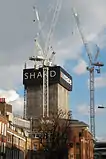 February 2010
February 2010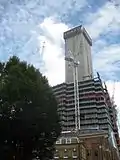 July 2010
July 2010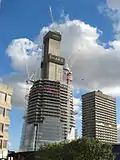 September 2010
September 2010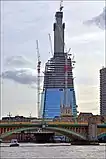 November 2010
November 2010 January 2011
January 2011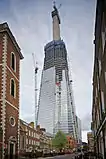 April 2011
April 2011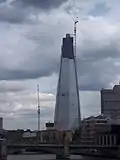 August 2011
August 2011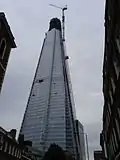 October 2011
October 2011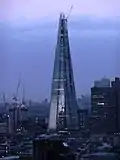 April 2012
April 2012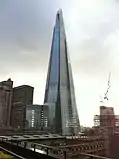 May 2012
May 2012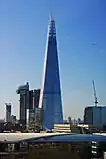 January 2013
January 2013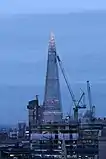 August 2013 (Completion)
August 2013 (Completion)
Height
Standing 309.6 metres (1,016 ft) at its highest point, and 308.5 metres (1,012 ft) at the highest point of its steelwork,[19] The Shard became the tallest building in the European Union in December 2011,[55] and the tallest completed building in Europe on 30 March 2012. It is taller than Frankfurt's Commerzbank Tower at 259 m (850 ft) the record holder between 1997 and 2005 and three later skyscrapers of Moscow: the Triumph-Palace, Naberezhnaya Tower, and City of Capitals. These three had each held the title for roughly 2 1⁄2 years. The Shard was overtaken by a fourth such tower in November 2012: the 339-metre (1,112 ft) Mercury City Tower.[60][61] The Shard is set to be surpassed as the tallest European building outside Russia by the 310 metre (1,017 ft) Varso Tower, Warsaw, Poland upon its completion in 2021, and the 323-metre (1,060 ft) Hermitage Plaza building, which is planned to be completed in La Défense, Paris, in 2024.[62]
The Shard is the second-tallest free-standing structure in the United Kingdom, after the 330-metre (1,083 ft) concrete transmission tower at Emley Moor.[18] Another planned London skyscraper, the Pinnacle (now replaced by 22 Bishopsgate), was originally proposed to rival the height of The Shard, but was reduced to a height of 287.9 metres (945 ft) because of concerns from the Civil Aviation Authority.[63] It is taller than all of the natural peaks in London and in adjoining counties, the highest of which is Walbury Hill, close to Wiltshire.
Tenants
The Shard comprises a 26-floor office complex, occupied by 32 companies across ten business sectors, three restaurants - aqua shard, oblix and Hutong, the five-star Shangri-La Hotels and Resorts, ten residential apartments and the UK's highest viewing gallery, The View from The Shard.
In February 2013, The Sunday Times reported that the developers of The Shard were in negotiations to secure the first tenants of the building's 26 floors of office space. At the time, potential tenants included financial restructuring specialists Duff & Phelps, private equity firm Hatton Corporation and the South Hook Liquefied Natural Gas Company.[64][65]
The Shard's fourth, fifth and sixth floors host the HCA (Hospital Corporations of America), part of London Bridge Hospital. The Shard's 31st, 32nd and 33rd floors host three restaurants: Oblix,[66] Hutong[67] and Aqua Shard.[68] The building's Shangri-La Hotel occupies floors 34–52.[69] The hotel was initially expected to open by the end of 2013,[70][71] but its opening was ultimately delayed to 6 May 2014.[72] In March 2014, Mathys & Squire became the first law firm to take tenancy in the building.[73][74] In May 2014, the Foresight Group, an investment firm, moved its head UK office into The Shard on the 17th floor.[75] In June 2015, Warwick Business School opened its new base in The Shard, occupying the same floor and was officially opened by the mayor of London, Boris Johnson.[76] It houses a 100-seat lecture theatre and a smaller one at 60 seats, plus eight seminar rooms and an IT lab, offering postgraduate and executive education.[77]
In July 2013, the Qatari broadcaster Al Jazeera Media Network announced that it would open a new television studio and newsroom for Al Jazeera English in The Shard.[78] Al Jazeera moved in on 13 September 2014; its first live broadcast from the building was on 10 November 2014.[79] The facility currently houses all primary operations for Al Jazeera Media Network's channels in London; it is capable of running an entire channel independent from Al Jazeera's other hubs, and is the network's second-biggest hub after its facility in Doha, Qatar.[80]
In January 2015, further tenants for The Shard were announced, including IO Oil & Gas Consulting, Gallup and The Office Group.[81] In May 2015, the American recruitment consultancy Robert Half International announced that it would move several branches of its business into The Shard, having purchased 20,000 square feet (1,900 m2) of floor space on the tower's tenth floor.[82] In August 2015, the international law firm Greenberg Traurig announced that it would open its offices on the eighth floor of The Shard by the end of the year.[83]
Matches Fashion took over 35,000 sq ft in January 2016, and six months later expanded its headquarter's presence in The Shard by 40%. In March 2016, marketing agency Jellyfish signed a lease for 9,017 square feet (837.7 m2) of office space on the 22nd floor, with occupancy beginning later in the year.[84] A month later, publishing house Dods Group let almost 17,000 square feet (1,600 m2) on Level 11, becoming The Shard's 28th office occupier. In December, Kraft Heinz relocated their European and UK headquarters from Hayes in Hillingdon to The Shard after taking 38,000 square feet (3,500 m2) on Levels 20 & 21.
The Shard offices were announced as fully let in October 2017, following lettings to Mitie and existing occupiers, Foresight Group and Warwick Business School.
Urban exploration, BASE jumping and climbing
In December 2011, a group of recreational trespassers calling themselves the Place Hackers evaded security and made their way to the top of the Shard building site, climbing one of the tallest cranes in the process.[85] They later posted photographs of the London skyline taken from the top of the Shard on the Internet and received wide media attention. One member of the group, Oxford University researcher Bradley Garrett, later revealed to various news outlets that over 20 urban explorers had made their way to the top of the building during its construction.[86] In a 2012 article for Domus magazine, Garrett wrote that "the conceptual barrier to places in our cities is brought about by a process of engineered exclusion" and that the explorers were "cultivating the creative city that money can't buy".[87]
BASE jumpers reportedly jumped from The Shard more than a dozen times between 2009 and 2012. Four jumps were reportedly made by Essex roofer Dan Witchalls, who had filmed one attempt with a helmet-mounted camera. The highest jump was said to have been from a height of 260 metres (850 ft).[88] In March 2016 another person BASE jumped from The Shard.[89]
On 3 September 2012, a team of 40 people, including Prince Andrew, Duke of York, abseiled from the tower's 87th floor. This feat was performed to raise money for the Outward Bound Trust and the Royal Marines Charitable Trust Fund.[90][91] In November 2012, the French urban climber Alain Robert was spotted in the building by security guards. At the end of the month, the Shard's owners won an injunction to prevent him from entering or climbing the building.[92]
On 11 July 2013, six female Greenpeace volunteers climbed the Shard and unfurled a flag in protest against Arctic oil drilling by Royal Dutch Shell.[93] The women announced they were "experienced climbers", but medical personnel were summoned to the base of the tower nonetheless.[93] The Shard's staff closed the tower's observatory and gave the women a safety briefing and other advice during their climb.[93] After completing their 16-hour climb, the six women were arrested by police on suspicion of aggravated trespass.[93]
In popular culture
- The Shard appears in the 2012 short film The Snowman and The Snowdog and its tie-in computer game.[94]
- The Shard has a significant role in the 2013 Doctor Who episode "The Bells of Saint John" as the headquarters of the episode's antagonist, the Great Intelligence. The Doctor vertically rode an anti-gravity motorbike on the face of the building and through a window to reach the Great Intelligence's headquarters.[95]
- The Shard appears in the climactic scene of the 2019 film Spider-Man: Far From Home. It is Nick Fury/Talos's & Maria Hill/Soren's lookout while the final battle takes place between Spider-Man and Mysterio on Tower Bridge.[96]
- The Pokemon Duraludon and its Gigantamax from Pokémon Sword and Shield are based on The Shard.
See also
- List of tallest buildings and structures in London
- List of tallest buildings in the world
Similar structures
Footnotes
- The building's operators officially stylise its name as The Shard, with the word "the" capitalised.
References
- As of CTBUH guidelines when building is completed, and of CTBUH Awards Criteria for skyscrapers.
- Brogden, Jim (2019). Photography and the Non-Place: The Cultural Erasure of the City. Springer. p. 128. ISBN 978-3-030-03919-6.
- "Shard London Bridge, London - SkyscraperPage.com". SkyscraperPage.com. Retrieved 16 September 2017.
- "The Shard Opens Viewing Deck To Visitors". Sky News. 2 February 2013. Retrieved 2 February 2013.
- The Shard: The Official Guidebook. Thames & Hudson (2013). p. 22. ISBN 9780500342848.
- Piano, Renzo (2013). The Shard: London Bridge Tower (in English and Italian). Matador. p. 74. ISBN 978-88-6264-006-0.
- "The Shard – The Skyscraper Center". Council on Tall Buildings and Urban Habitat. Retrieved 26 April 2013.
- The Shard at Emporis. Retrieved 27 November 2012.
- "Inauguration of the Shard Tower in London on July 5th 2012" (Press release). Business Wire. 30 April 2012. The Shard is managed by Real Estate Management (UK) Limited on behalf of the owners.
- Bar-Hillel, Mira (24 February 2009). "£28bn Shard of Glass to start its ascent". London Evening Standard. Archived from the original on 27 May 2010. Retrieved 7 July 2010.
- "Work starts on Shard of Glass". New Civil Engineer. 2 April 2009. Retrieved 7 July 2010.
- "London Bridge Tower, London". Designbuild-network.com. 15 June 2011. Retrieved 6 July 2012.
- Weaver, Matt (15 April 2003). "Battle begins for London Bridge Tower". The Guardian. London. Retrieved 6 February 2013.
- "Shard funding crisis: Tower finances cast shadow over project". World Architecture News. 10 September 2007. Retrieved 7 July 2010.
- "Why do tall buildings have such silly names?". BBC News. 26 November 2010. Retrieved 27 November 2010.
- "List and details of the tallest buildings in the world". infoplease.com. Infoplease Encyclopedia. Retrieved 29 August 2015.
- "A vertical city". The-Shard.com. Retrieved 5 August 2015.
- "Emley Moor". TheBigTower.com. Retrieved 12 February 2013.
- "Shard Tops Out". Skyscrapernews.com. 30 March 2012. Retrieved 2 April 2012.
- "The Shard opens up to share its high, wide and handsome view". The Guardian. 11 January 2013. Retrieved 12 January 2013.
- "The Shard may open for events, but not until late 2013". Event. 9 August 2012. Retrieved 14 November 2012.
- Whitten, Nick (20 May 2009). "Shard observation deck to be Europe's highest". Cnplus.co.uk. Retrieved 6 July 2012.
- Bourke, Chris (20 January 2010). "Shard Developer Sellar to Seek Highest Office Rents Since 1980s". New York: Bloomberg. Retrieved 7 July 2010.
- Milmo, Cahal (25 July 2002). "London's 'Shard of Glass' must face public inquiry". The Independent. London. Retrieved 7 July 2010.
- "'The Shard' set to change the London skyline". Londonoffices.com. 24 February 2011. Archived from the original on 8 July 2012. Retrieved 6 July 2012.
- Sudjic, Deyan (18 May 2003). "Sold down the river". The Observer. London. Retrieved 3 February 2013.
- Weaver, Matt (19 November 2003). "'Shard of glass' set to join London skyline". The Guardian. London. Retrieved 3 February 2013.
- "Shard construction moves closer with £196 million deal". London SE1. 19 September 2006. Retrieved 7 July 2010.
- Lane, Thomas (2007). "Imagine that you are on level 80 and you want a sandwich. How long will that take you?". Building (36). London. Retrieved 3 February 2013.
- Monaghan, Angela (17 September 2007). "London's tallest skyscraper grounded by global credit crunch". The Daily Telegraph. London. Retrieved 3 February 2013.
- Richardson, Sarah; McMeeken, Roxane (17 October 2008). "Mace's price for Shard rises by almost £85m". Building. London. Retrieved 3 February 2013.
- Rogers, David (2 April 2008). "Cleveland Bridge favourite for Shard of Glass steel prize". Construction News. London. Retrieved 3 February 2013.
- "History of The Shard". VisitTheLondonShard.com. Archived from the original on 11 September 2017. Retrieved 10 October 2012.
- Thomas, Daniel (23 January 2008). "Qataris back London's 'Shard'". Financial Times. London. Retrieved 3 February 2013.
- "History of The Shard, London Bridge". Shardldn.com. Archived from the original on 13 July 2012. Retrieved 7 July 2012.
- Kenneth Powell (2003). New London Architecture. Merrell. ISBN 1-85894-232-2.
- "The Shard Combined Heat and Power Plant". Clarke-Energy.com. Retrieved 10 July 2012.
- "Shard at London Bridge Tower". Structure. June 2008. Retrieved 22 December 2012.
- "The Shard – Europe's tallest building". Engineering & Technology Magazine. 12 September 2011. Retrieved 20 July 2013.
- CNN Staff (20 May 2014). "World's best new skyscraper is ..." CNN. Retrieved 20 May 2014.
- "About HCA Healthcare at The Shard". HCA Healthcare at The Shard. Retrieved 16 September 2017.
- "Companies – Companies". The-Shard.com. 2015. Retrieved 21 April 2015.
- "Explore the Shard – Vertical City". The-Shard.com. 2011. Archived from the original on 18 June 2012. Retrieved 6 July 2012.
- "Al Jazeera London, The Shard". Billionpoints.de. 2014. Retrieved 23 February 2015.
- "The Vision". The Shard.
- "Shard Building Report" (PDF). Estates Gazette. 28 June 2012. Retrieved 15 February 2013.
- "Shard Tower Crane Rises". Skyscrapernews.com. 22 September 2009. Retrieved 21 February 2013.
- Matt Brown (10 February 2010). "In Pictures: The Shard Rises Damnably Fast". Londonist.com. Retrieved 6 July 2012.
- Kennett, Stephen (30 April 2010). "The Shard: Foot of the mountain". Building. London. Retrieved 7 July 2010.
- Glancey, Jonathan (23 November 2010). "Shard to become EU's tallest building – but will the market follow it up?". The Guardian. London. Retrieved 17 August 2013.
- "Fox lived in the Shard skyscraper at London Bridge". BBC News. 24 February 2011. Retrieved 18 September 2020.
- "Eyewitness: The Shard". The Guardian. 19 September 2011. Retrieved 6 July 2012.
- "Crane Gives Dizzying Bird's Eye View of London". Sky News. 26 September 2011. Retrieved 15 February 2013.
- Prigg, Mark (15 November 2011). "Now comes The Shard part ..." London Evening Standard. Archived from the original on 26 January 2012. Retrieved 4 February 2013.
- "Qatar's Shard the tallest building in Europe now". Gulf Times. 3 January 2012. Archived from the original on 3 January 2012. Retrieved 6 July 2012.
- "Shard's spire now in place on Europe's tallest building". BBC News. 30 March 2012. Retrieved 6 July 2012.
- "London's Shard gets spire to become Europe's tallest building". Metro. UK. 30 June 2012. Retrieved 6 July 2012.
- "April 2012 News". Londonbridgequarter.com. April 2012. Archived from the original on 11 July 2012. Retrieved 6 July 2012.
- "Shard owners shatter abseiling ambition of Hague Snr". The Independent. 24 May 2012. Retrieved 8 June 2012.
- 'The sky's the limit' (Editorial). Financial Times (London). 6 July 2012. Retrieved 9 July 2012. (registration required)
- "Russia's Mercury City tower cuts The Shard down to size". The Guardian. 5 November 2012. Retrieved 11 December 2012.
- "Paris Hermitage towers to close financing this year, cost now €3bn". Property Investor Europe. 17 September 2013. Archived from the original on 9 July 2015. Retrieved 16 December 2014.
- "The Pinnacle". Emporis. Retrieved 9 June 2012.
- "At last, Shard lures tenants". The Sunday Times. London. 24 February 2013. Retrieved 26 February 2013.
- "Shard Said to Get Duff & Phelps as Tower's First Tenant". Bloomberg. 30 April 2013. Retrieved 17 July 2013.
- "Restaurant: Oblix, London". The Guardian. London. 8 June 2013. Retrieved 28 June 2013.
- "Hutong at The Shard". The Handbook. 6 June 2013. Retrieved 25 June 2013.
- "Aqua Shard". Time Out. 7 January 2013. Retrieved 28 June 2013.
- "Shangri-La Hotel, At The Shard, London - SPACE | International Hotel Design". SPACE | International Hotel Design. 16 September 2015. Retrieved 21 February 2018.
- "Excitement builds for Shangri-La's summer opening at The Shard". Hospitality Interiors. 13 March 2013. Retrieved 4 August 2013.
- "Shard's luxury hotel hit by fit-out delays". Building.co.uk. 6 June 2013. Retrieved 4 August 2013.
- "Shangri-La London opens in The Shard". The Daily Telegraph. London. 6 February 2014. Retrieved 21 April 2014.
- Joanne, Harris (21 March 2014). "IP firm Mathys & Squire becomes first firm to move into Shard". The Lawyer. Retrieved 17 April 2014.
- Kate, Allen (13 February 2014). "Shard finds more tenants as Irvine Sellar steps up lettings". Financial Times. Retrieved 17 April 2014.
- "May 2014 news". The-Shard.com. Archived 30 May 2014 at the Wayback Machine
- "Boris Johnson officially opens WBS London at The Shard". wbs.ac.uk. WBS. Retrieved 3 August 2017.
- "Warwick Business School to open London campus in the Shard". Financial Times. Retrieved 3 August 2017.
- "Al Jazeera to open new TV studio in The Shard". London Evening Standard. 17 July 2013. Retrieved 31 July 2013.
- "Al Jazeera moves into The Shard". The-Shard.com. 2014. Retrieved 15 November 2014.
- "Al Jazeera overhauls digital workflow with new hub". BroadcastNow.co.uk (subscription required). 6 November 2014. Retrieved 26 January 2015.
- "Video: Inside The Shard with The Office Group". Property Week. 3 December 2015.
- "THE SHARD SECURES A FURTHER 20,200 SQ FT LETTING FROM GLOBAL RECRUITMENT SPECIALIST, ROBERT HALF". The-Shard.com. 15 May 2015. Retrieved 19 August 2015.
- "Going south of the river: Greenberg Traurig Maher set for The Shard as it looks to boost City headcount". LegalBusiness.co.uk. 14 August 2015. Retrieved 19 August 2015.
- "The Shard inches closer to being filled after confirming second letting for 2016, with digital marketing agency Jellyfish due to move into level 22 soon". City A.M. 2 March 2016. Retrieved 1 February 2018.
- "Trespassers reached top of London's Shard skyscraper". BBC News. 9 April 2012. Retrieved 4 February 2013.
- "Shard hacking: group sneak to top of Europe's tallest building". The Guardian. London. 9 April 2012. Retrieved 3 September 2013.
- Garrett, Bradley (9 July 2012). "Scaling the Shard". Domus. Retrieved 3 September 2013.
- Matthew Holehouse (13 April 2012). "Base jumper films himself parachuting off The Shard four times". The Daily Telegraph. London. Retrieved 3 May 2012.
- "Daredevil base jumper leaps off The Shard skyscraper in London". ABC News. ABC. 13 March 2016. Retrieved 13 March 2016.
- Cooke, Jeremy (3 September 2012). "Prince Andrew abseils down Shard". Southwark, London: BBC News. Retrieved 3 September 2012.
- "Prince Andrew To Leap Off Shard Skyscraper". Sky News. 3 September 2012. Retrieved 3 September 2012.
- "Forget the Green Goblin ... Shard to stop French 'Spiderman' Alain Robert – with an injunction". The Independent. 1 December 2012. Retrieved 2 December 2012.
- "Greenpeace protesters reach summit of The Shard in London". BBC News. 11 July 2013. Retrieved 16 July 2013.
- "The Snowman and the Snowdog, Channel 4". The Arts Desk. 25 December 2012. Retrieved 21 February 2013.
- "The Bells of St John heralds Doctor Who's return". Doctor Who News. 1 March 2013. Retrieved 8 March 2013.
- "Spider-Man: Far From Home", Wikipedia, 4 July 2019, retrieved 4 July 2019
External links
| Wikimedia Commons has media related to The Shard. |
- Official website

- The Shard, London
- The Shard on CTBUH Skyscraper Center.
- The Shard Special. Estates Gazette. 2012. Retrieved 4 February 2013.
- Live daylight webcam image via Google Sites.
- Internal and external photos of the Shard via Shardldn.com.
| Records | ||
|---|---|---|
| Preceded by One Canada Square |
Tallest building in London 2010–present 309 metres (1,014 ft) |
Current holder |
| Tallest building in the United Kingdom 2010–present 309 metres (1,014 ft) | ||
| Preceded by Commerzbank Tower |
Tallest building in the European Union 2010–2020 309 metres (1,014 ft) |
Succeeded by Commerzbank Tower |
| Preceded by City of Capitals |
Tallest building in Europe January 2012 – November 2012 309 metres (1,014 ft) |
Succeeded by Mercury City Tower |

